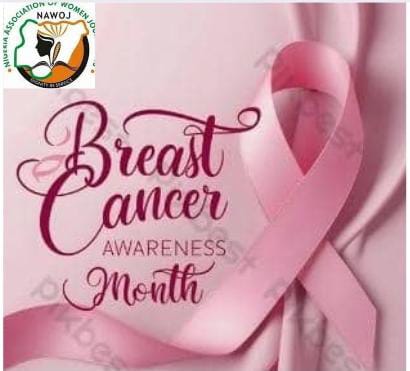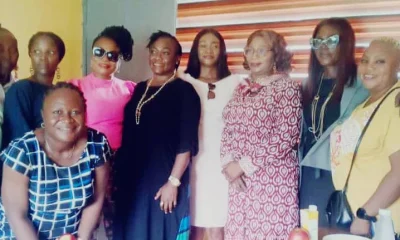Health
NAWOJ Lagos Champions WHO 60-60-80 Strategy, Calls For Stronger Advocacy For Breast Cancer Care

As Breast Cancer Awareness Month draws to a close, the Nigeria Association of Women Journalists (NAWOJ), Lagos State Chapter, has called for stronger commitment from policymakers, healthcare providers, and partners to adopt the World Health Organization’s Global Breast Cancer Initiative (GBCI) 60-60-80 strategy for improved survival outcomes among Nigerian women.
In a statement signed by its Chairperson, Mrs. Jumoke Falayi-Johnson, and Secretary, Anu Thomas, NAWOJ Lagos emphasized that the suffering of women battling breast cancer can be significantly reduced through better access to timely diagnosis, treatment, and care.
Falayi-Johnson noted that the WHO’s 60-60-80 framework offers a practical and achievable pathway to save lives.
The strategy aims for 60 percent of invasive breast cancers to be detected before stage two, diagnosis to be confirmed within 60 days of a patient’s first clinical visit, and 80 percent of diagnosed women to complete their treatment.
“When a woman battling breast cancer sees strong support systems and structures that guarantee her survival, she is encouraged to fight harder. It’s a chain link support, structure, survival,” Falayi-Johnson said.
She added that adopting this strategy across Nigeria would transform breast cancer outcomes and urged everyone — from government officials to journalists and health workers — to play their part in raising awareness and supporting affected women.
“I believe that the woman in a remote village should not have to fight breast cancer alone.
Whether you are in an office in Alausa, a hospital in Ikeja, or a newsroom in Obalende, you can contribute to her survival through advocacy and action,” she said.
Reaffirming NAWOJ’s role in the fight against breast cancer, Falayi-Johnson stated that the association will continue to serve as a bridge between women living with the disease and those positioned to help them survive.
“Let’s end breast cancer by ensuring it does not end more lives,” she urged.
The association also aligned its advocacy with this year’s global theme, “Every Story is Unique, Every Journey Matters,” stressing that, beyond awareness, real progress lies in dismantling the systemic barriers that hinder women’s access to care.





















